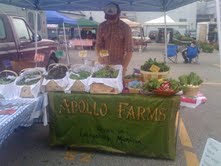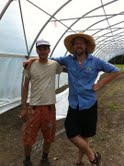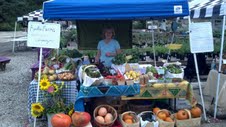What is a Farmer? A Modern Young Beginning Farmer Profile
What is a Farmer?: A modern day farmer profile – guest post from Alex Bryan, a resourceful young beginning farmer.
I am a farmer. A young farmer, from rural mid-Michigan and I grow, create cultivate and provide through multiple projects in my life. I grow large amounts of food in Laingsburg, Lansing, and Detroit and I work at a food bank in Lansing. I’ve worked at an olive farm in Portugal, a dairy farm in Turkey, and a citrus farm in New Zealand. Before moving back home to Michigan I spent two years on the New Hampshire seacoast cooking at an upscale Spanish wine bar (think food art) and working on an organic farm (heated hoops in the winter with waste vegetable oil) for ‘free’ food. Currently I’m:
In Laingsburg, I have a homestead/market garden on family land with my mother that we run as Apollo Farms. We try to grow things from all over the world and things native to Michigan. From spinach and squash seeds brought back from a trip to Turkey or paw paws from a local nursery. The land was inherited from my grandfather, who ran a multi-generational multiple hundreds acre apple orchard that, like many small and mid-size farms, failed in the 90’s. All of the tractors, equipment, barns and majority of the land were sold at auction for pennies on the dollar. The family was able to keep about 400 acres of cash crop land that is currently leased to other farmers with equipment. The orchard was parceled off and apple trees now stand barren, disregarded and overgrown, surrounding happy vinyl sided houses that are especially twisted looking in winter.
In Lansing, I grow food at my house in the city, from chickens to chicory. I also have a couple plots at some of the 90+ community gardens that the Garden Project of the Greater Lansing Food Bank provides resources for. This leads to my day job as Volunteer and Outreach Coordinator at the Greater Lansing Food Bank, allowing me to find ways to help make food more equitable and accessible. Through the Garden Project we are able to provide seeds, starts, tools, access to water and land, compost, books, canning supplies classes and workshops. Through the food bank we provide money and food to 80+ agencies, like low-income housing units, community centers, food pantries, or soup kitchens feeding tens of thousands of people in our small community. I coordinate the volunteers for a field-gleaning program rescuing 250,000+ pounds of produce annually from area farms, saving it from the compost pile. As of late, I’ve been able to help form a local food system workgroup that is functioning much like a food policy council for the Greater Lansing area, organizing conferences on food systems and food stability. I’ve worked with National Young Farmers Coalition to press Senator Stabenow on policies that are conducive to new and beginning farmers.
In Detroit, I co-own and manage a 4-acre parcel of land near the Boston-Edison neighborhood and Highland Park, called Food Field (not quite where the Lions play). My partner and fellow Laingsburg and University of Michigan grad, Noah Link, lives and works full time at the farm. At about ¾ of a year old we have cultivated ½ acre, cover cropped 2 ½ acres, built a 32×96 hoophouse with a partnership from SELMA café, hired an intern, employed a few neighborhood youth and have been working vigorously on funding and zoning.
Straight from our mission statement on our website: “Our goal is to join in the revitalization of Detroit by developing a successful, community-based business and to meet the need for local, affordable, sustainably produced food. We believe in a triple bottom line setting environmental, social, and economic goals, all of which an urban farm contributes to. Our priority is to produce fresh, healthy, and delicious food while improving the neighborhood and creating economic opportunities.
We believe it is important to operate as a business to show that organic, urban agriculture can be economically viable. While sustainable farming and gardening does bring a variety of other benefits, we must be able to create an alternative and not merely a supplement to our industrialized food system.”
For 2012 we’ve ordered dozens of fruit trees, are planning on expanding our growing space, will focus on chickens for meat and eggs, and will begin our setup for growing fish. We also hope to sell a 20-25 share CSA.
I never thought I would be, not at any single moment growing up, but I am a farmer.
Define a farmer
Looking back, I never thought of myself as a farmer or of becoming one. My grandfather was a farmer, he grew apples in mid-Michigan, and I helped occasionally. But, I was not a farmer, not in my eyes. Certainly, not by the definition I had concocted in my head of images of button up plaid work shirts, funny tall trucker hats, driving a tractor or a truck through never ending fields of corn, wheat, apple orchard or the like.
This thought process begs the question, though, what is a farmer? Who are they and what do they do? How do we define this enigmatic, almost mythical, being in America? I’m not sure I can lay an answer on the table that suits a vision for everyone, but simply what I’ve grown to understand as my idea.
A farmer grows, a farmer cultivates and creates, a farmer provides. I think these are all tenants we can agree upon. What I would suggest is that it is not limited to food.
Take a look at your modern day farmers market. When I’ve setup for market, I come with tomatoes, peppers, onions, mixed greens, etc. but I also setup with stained glass, knitted handbags, t-shirts, and poetry. I’m not the only person doing this, either. I created, and I opened a space for others to grow their products, with me and for me. During my time at Buckhorn Gardens in Colorado I grew a lot of food, but I also made soap with leftover goats milk, tanned hides for drums, and provided a space for weekly K-12 school fieldtrips. Helping at a farm in New Hampshire’s seacoast we’d sell wraps, smoothies and soups from farm produce. We cultivated community through a CSA and grew friendships and bonds with our customers. My farmer friends had two little kids, Nasturcia and Thesun, who were grown on the farm, born and bred in the farmhouse, even. (On a side note at two years old, they named the chickens “Nuggets”, which I still find hysterical.) Reading ‘One Straw Revolution’ Fukuoka talks about Japanese farmers historically writing haikus and other poetry through the winter, focusing energy on creative pursuits to feed the soul as much as the body. In the more modern day, Joel Salatin is the perfect example of a farmer who creates more than food. His literature, speeches and overall farming method have assisted a slow revolution among new and beginning farmers across the country and world. His creation of a national awareness on food with others in the field, has allowed for a focus on local, sustainable farming. This beginning paradigm shift has created a market for the thousands of young farmers that are shaping the political landscape through organizations like National Young Farmers Coalition.
I say all of this because a farmer can no longer afford to be that one off image standing in a wheat field at sunset, with the herding dog, American made truck and tractor next to them. (Don’t worry, I have an old red F150 that I love and find very useful.) The farmer grows, creates, and cultivates in every, and all, facets of life. It seems to be as much of a necessity as it is a choice. Without the extra income, the culture, community, or brand awareness that comes from growing more than food, it’s nearly impossible to start a farm today.
To get back to my definition: A farmer grows, creates, cultivates, and provides.
I asked Alex to share his experience because I thought it would be insightful and interesting to many of you. Hopefully he’ll be sharing more posts about specific aspects of his journey and his learning process here in the future. Thanks Alex! – TR



 Your Privacy Choices
Your Privacy Choices
I enjoyed reading your article. It reads as if my grandfather who was born in Detroit in the1890’s wrote it. We need to all consider farming and our food system with this perspective. Such a breath of fresh air!
Glad you like the article. Wish I could take credit. Alex is awesome!
Very inspirational! Thanks for sharing.
Amazing. How on earth have you found time to do all of this?